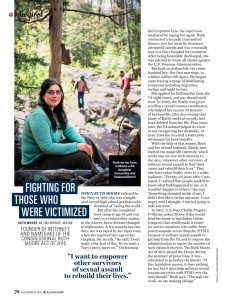Over the past 25 years, Naomi Eisenberger has sought out individuals who do good in their own communities and beyond. As the Executive Director of The Good People Fund (www.goodpeoplefund.org), she is responsible for discovering and supporting grassroots organizations that respond in creative ways to society’s most intractable problems. While certainly not household names, each program is making an impact in their respective areas. There are approximately 75 grantees under her guidance throughout North America and abroad. These dedicated Good People work quietly, most with little recognition and minimal funding, in an effort to improve the lives of society’s most vulnerable.
Eisenberger’s years of experience with small nonprofits makes her uniquely suited to advise her grantees in many areas. She realizes that there are some basic ideas that all organizations should embrace. “I work very closely with each of our grantees” explains Eisenberger. “Together we focus on board development, fundraising, staffing, administration and more; all critical to the success of any organization. I challenge them to think realistically about how best to implement this growth. It is a delicate balancing act that requires sufficient funding to underwrite the costs of additional staff. II approach each grantee as a partnership and most admit that having a friendly supportive voice on the other end of the phone makes their efforts easier. Very few of our grantees have any formal training in nonprofit management so having someone to help answer the difficult questions is important. I have created and implemented a unique ideology that includes vetting and supervising each grantee, as the means to making the Good People Fund’s work both unusual and highly effective.”
One organization that has benefited from Eisenberger’s guidance and funding is Amir Project, which places sustainable gardens within summer camps and uses them as a tool to foster and teach social justice practices. Amir’s founder, David Fox, created the organization while still a college student. Upon graduating he formally incorporated Amir Project and set about raising funds to make his dream possible. One of David’s first fundraising attempts was a visit with Eisenberger where he detailed his vision. Eisenberger immediately recognized David’s passion for this work and Impressed with David’s ideas and his personality, immediately offered him his first grant, a matching grant to hopefully inspire others. David found the matching funds and Amir Project was on its way. That first GPF donation led to additional grants over the next five years as well as ongoing mentoring to help David resolve challenges related to the organization’s growth. Today more than 8,000 young people have been exposed to the Amir Project which operates in 30 camps nationwide.
Eisenberger has always believed that small actions can have huge impacts, whether it is to start a nonprofit or support one, and shares that belief with others. Since its inception in 2008 the Good People Fund has raised and granted more than $7 million dollars to these small programs working diligently, but quietly, to improve lives.
Naomi Eisenberger is the founder and Executive Director of The Good People Fund. For the past decade, she has drawn on her extensive business and nonprofit experience to help grantees build their own successful nonprofit organizations.






